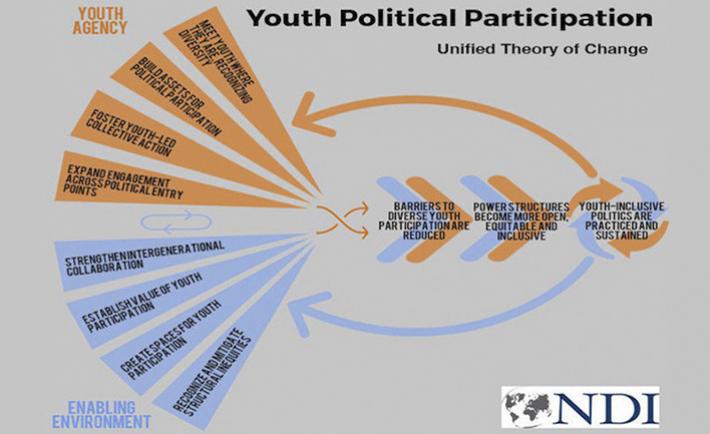Surging youth activism and leadership has the potential to change the world. Accordingly, young people are increasingly being recognized as indispensable agents for sustainable development and the source of a demographic dividend. But more work is necessary to support their active engagement and satisfy young people’s desire to have more than just a seat at the table.
To help meet this need, NDI recently completed a global study to better understand how youth political participation can be increased and sustained. The study included a review of the contemporary youth development literature, critical examinations of several NDI programs and a small-group reflection session with other democracy and governance practitioners. NDI also spoke directly with groups of young political activists in Africa and Latin America to gain their perspectives on the barriers to participation, and drew specific program implementation lessons from deep reviews of its effective work with youth in Jordan and Kosovo.
NDI used the study’s findings to develop a unified theory of change, illustrated in the graphic above, which depicts the process of institutionalizing meaningful youth political participation. The theory “unifies” multiple elements that contribute to informed, active and sustained participation.
The process involves two key elements: 1) strengthening youth agency as change-makers; and 2) fostering an enabling environment for youth participation. Agency refers to the personal characteristics and abilities that enable youth to act individually and collectively, while the enabling environment refers to systemic factors that can enhance or inhibit youth political participation.
Building youth agency requires learning by doing that harnesses young people’s unique motivations for political engagement, while building their technical knowledge of political organizing and “soft skills” -- knowledge, skills, behaviors, and personal qualities that enable effective political participation. Approaches to building youth agency must “meet youth where they are”, by recognizing and accounting for different starting points and needs among diverse youth based on identity, location, culture and other contextual circumstances. Fostering a supportive environment requires efforts to:
- recognize and address structural inequities that disadvantage youth based on their gender and other identities;
- create spaces for youth to interact with power holders and build relationships;
- establish the value of youth participation through demonstrations of leadership and constructive engagement; and
- strengthen intergenerational relationships through collaboration.
This process of youth action and interaction with adult leaders must be repeated over time to build the necessary partnerships to collaborate to address issues facing the public. If citizens and adult leaders see positive change as a result of this work, they will begin to rely more heavily on youth as leaders. This in turn causes formal power structures, or organizations and systems with authority in a given context, to become more open to youth participation. The process feeds upon itself, ultimately improving and expanding youth agency and creating a more supportive environment for youth voice. As this cycle repeats over time, power dynamics continue to transform and youth-inclusive political practices are sustained.
This theory is at the center of a new guide for youth political participation programming, which NDI will launch online in July. Over the next few weeks, NDI will publish two more blogs providing a sneak peek into the new guide.

